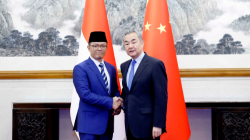
Experts gathered in Beijing over the weekend for the 2025 China Medical Development Conference, where the integration of artificial intelligence (AI) and healthcare has become the center of attention.The two-day event, held annually since 2021, brought together leading voices in mathematics, AI, medicine, public health and pharmacy to discuss innovation, interdisciplinary collaboration and policy directions to drive the medicine sector forward in the AI age.Attendees emphasized AI's transformative potential in reshaping medical research and the broader healthcare ecosystem.Wang Chen, vice president of the Chinese Academy of Engineering and president of the Chinese Academy of Medical Sciences (CAMS), proposed a phased road map for integrating AI into medicine.According to Wang, in the short term, scenario-based pilot programs will take the lead.
The medium term will focus on deeper applications and international collaboration, while the long term aims to establish an AI-driven ecosystem encompassing scientific research, clinical care and healthcare management.Zheng Hairong, vice president of Nanjing University, stressed that breakthroughs in biomedical AI must be underpinned by standardized data and ethical governance.
He pointed to fields such as medical imaging and brain-computer interfaces as areas where cross-disciplinary collaboration will be crucial in overcoming technological hurdles.In recent years, China has ramped up its "AI Plus" initiative in healthcare, promoting standardized infrastructure, cross-institutional data sharing and the development of industry-specific AI models to improve the precision and efficiency of diagnostics and treatment.Ensuring the safe and responsible deployment of AI technologies in healthcare was a recurring theme throughout the conference.
Participants underscored the importance of building a secure, well-regulated environment to maintain public trust.Shen Jianfeng, an official with the National Health Commission, called for the creation of high-quality medical datasets and AI language corpora.
He also urged stronger policy coordination across disciplines and investment in talent development, with a focus on medical ethics.A highlight of the conference was the release of the "Top Medical Advances in China 2024" by the CAMS, a list of 13 breakthroughs selected from over 310,000 research projects all seen as major steps forward in China's disease prevention and treatment capabilities.Among the standout achievements were a method to diagnose Alzheimer's disease up to 18 years before symptoms appear and a gene therapy breakthrough for hereditary deafness.

 15
15


















